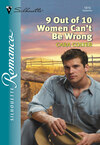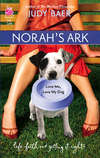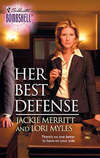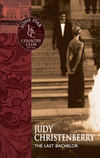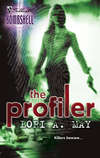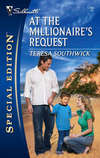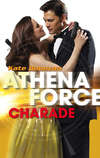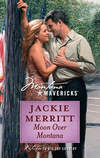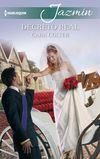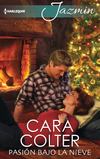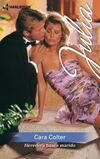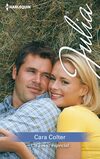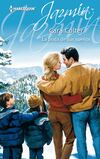Kitabı oku: «9 Out Of 10 Women Can't Be Wrong», sayfa 2
“Don’t you think it’s our obligation to fight the disease that took our mother? Don’t you remember how awful it was?”
He suspected he remembered better than she did, since he had been older at the time. He glared at her, seeing the corner she was backing him into. He said nothing and against his better judgment took another sip of the wine.
“That calendar could make the research foundation a lot of money.” She made sure she had his full attention, laid her hand on his. She named a figure.
He nearly spit out the wine. “Are you serious?”
“Dead serious. It’s not very many people who have a chance to give that kind of money to the charity of their choice.”
“Just because I said I don’t want to do it doesn’t mean they aren’t going to go ahead with the calendar.”
“No. But ninety percent of the women who voted liked you—ninety percent. That’s huge, Ty, especially if it translates into them buying calendars. There are 750,000 people in Calgary alone. I estimate 200,000 of them are women. If only fifty percent of them bought calendars, that would be a huge amount of money! In this city alone!”
He could feel his head starting to swim, and not from the wine. “Stacey,” he said carefully, enunciating every word, “I’m not doing it.”
He avoided saying never.
“Oh, Ty.” She sighed and looked at her fingernails. “You wouldn’t even have to come in to the city. You wouldn’t even have to miss an hour’s work.”
“I said no.”
“You wouldn’t even know the photographer was there. The photographer’s all lined up. World class.”
“No.”
“So, it won’t cost you anything, not even time, and you have a chance to contribute so much to a cause that is very meaningful to you, and you say no?”
“That’s right,” he said, and he hoped she didn’t hear the first little sliver of uncertainly in his voice.
“If the calendar was a huge success, I think I’d get a raise. I’d be able to buy a little house. With a backyard for Basil.”
“Basil is the Saint Bernard, I hope.”
She nodded sadly. “I think the landlord suspects I have him.”
“I’m not posing for calendars so you can keep a dog that’s bigger than my horse and has the dubious talent of opening a fridge.” At least, he thought, his sister was planning her life around a dog, and not the hippie. He noticed she hadn’t mentioned the beau today. Did he dare hope he was out of the picture? Or was it because Ty had lost his temper when she had mentioned the hippie and marriage in the same breath once? He decided he didn’t want to know.
She took a little sip of her wine and looked at her lap. She finally said, in a small voice, “You know my chances of getting it are high, don’t you?”
“What?” There. She’d managed to completely lose him with her conversational acrobatics.
“My chances of getting breast cancer are higher than other peoples. Because Mom died of it.”
“Aw, Stacey.”
“The only thing that will change that is research.”
He looked across the table at her and saw her fear was real. He felt his heart break in two when he thought of her in terms of that disease. Wouldn’t he have done anything to make his mother well?
Wouldn’t he do anything to keep his little sister from having to go down that same road? From diagnosis to surgery to chemo to years of struggle to a death that was immeasurably painful and without dignity?
If he was able to raise those kinds of dollars to research a disease that might affect his sister, did he really have any choice at all? If the stupid calendar raised only half as much, or a third as much as his sister’s idealistic estimate, did he have any choice?
Wasn’t this almost the very same feeling he’d had the day a social worker had looked at him and said, “She could go to your uncle Milton. Or to a foster home close to here. If you can’t take her.”
He glared at his sister. He saw the little smile working around the edges of her lips and realized they both knew she had won.
“Don’t even think I’m taking off my shirt,” he said, conceding with ill grace.
“I don’t know, Ty. If you took off your shirt, we might be able to sell a million copies of the calendar.” She correctly interpreted the look he gave her. “Okay, okay,” she said, laughing. “Thank you, Ty. Thank you. I owe my life to you.”
He hoped that would never be true.
She got up out of her chair, came around the table, threw her arms around his neck and kissed him on his cheeks. About sixteen times.
Until everyone at the tables around them were looking over and smiling indulgently.
“This is my brother,” she announced, happily. “He’s my hero.”
Chapter Two
If Tyler Jordan was the most handsome man alive, being angry did not diminish that in the least. Maybe it even accentuated the rugged cut, the masculine perfection, of his sun- and wind-burned features.
And Harriet Pendleton Snow knew he was angry, even before he spoke. The energy bristled in the air around him.
“I was expecting a man,” he said, impatience flashing in his dark eyes. He looked down at a scrap of paper in his hand, and she caught a glimpse of bold, impatient handwriting. “Harry Winter.”
“Harrie Snow,” she corrected him. “That would be me.” He hadn’t recognized her. And she didn’t really know whether to be pleased or hurt by that.
A lot of things had changed in four years.
Outwardly. Inwardly she was doing the same slow melt she had done the first time she had met her best friend’s brother. She had been twenty-two years old when she had first met her best friend’s brother.
Standing right here in this same driveway, the little white frame house behind them, a larger barn behind that, the rolling hills of the Rocky Mountain foothills stretching into infinity on all sides of them, and all of that majesty fading to nothing when his eyes had met hers.
Dark and full of mystery.
Over the years she had tried to tell herself it was other things that had stolen her breath so completely that day.
The immensity of the land.
The romance of the ranch.
The fragrance of the air.
But standing before him now, she was not so sure.
“I find it hard to believe a woman like you is named Harry,” he snapped.
“Like me?” she said. “What does that mean?” Personally she found it even harder to believe that a perfectly rational woman like her mother had looked down at a squirming red-faced bundle of life and seen a Harriet. It was a name she hated and had been trying to lose for years.
He rolled a big shoulder, irritated, gestured. “Like you,” he said. “Polished, pretty—”
Polished. Which meant all the hours spent choosing just the right outfit, until her bed and her floor had been littered with discards, had been well spent. It meant that the new haircut had succeeded, for the time, in taming her wild curls. It meant her new hair color, copper, instead of plain old red, was as sophisticated as she’d hoped. It meant maybe it wasn’t so ridiculous to try to match your lip shade with your nail enamel.
Pretty. He’d called her pretty. For a girl who had grown up thinking of herself as plain at best, homely at worst, they were words she could never hear enough of.
But, before she had a chance to savor that too deeply, it sank in that he hadn’t exactly said pretty as if he thought it was a good thing.
“—an absolute pain around a ranch,” he was saying. “Were you going to ride a horse in a skirt, or is that supposed to put me in the right frame of mind to have my picture taken?”
Was he crankier than he had been back then? Stacey said he was perpetually cranky, but that was not what Harriet had seen in the week she’d been here four years ago.
She’d seen a young man who had shouldered a huge responsibility, defying the fact he probably was ill-prepared to act as anybody’s parent. She had seen he wore sternness like a tough outer skin so his sister wouldn’t see how easily she could have anything she wanted from him because he loved her so.
That love, despite his efforts to disguise it, had been just below the surface that whole week, in the tolerance he had shown both of them, even after the unfortunate accidents.
Accidents caused because Harriet wanted so badly to do everything right, was so nervous around him, so afraid she would say exactly the wrong thing, do exactly the wrong thing. She had wanted him to see her as grown-up and mature.
So of course he had seen her as a kid.
And of course she had spent the entire week doing things wrong, clumsily, self-consciously aware of the newfound feeling inside her.
She would have absolutely died if he’d thought of her as pretty back then.
Because she had fallen in love with him within minutes. Maybe even seconds.
She knew it to be ridiculous now. From the perspective of a woman who had had four years to think about it, to travel the world, to experience many adventures, to marry badly, she knew how ridiculous her younger and more naive self had been.
When she had seen the results of the vote conducted at the Sunny Peak Mall she had known how ridiculous her twenty-two-year-old self had been.
Ridiculous, but not alone.
Women loved him, pure and simple.
She had been given the rarest of things—a second chance. To prove she could be competent, that she was not in the least clumsy or accident prone.
And she had a second chance for him to see her as attractive, the thick bottle-bottom glasses no longer a necessity because of the miracle of laser surgery.
Her teeth as straight and white as money and time and steel could make them.
She knew how to dress now in a way that made her height and slenderness an asset. He might not like the skirt, but she hadn’t missed how his eyes had touched on the length of her legs. Her tendency to freckle was becoming less with each year, revealing a startling, lovely complexion underneath. She had learned how to use makeup to show off her eyes and her cheekbones. Some days, like today, she could almost tame the wild mop of her hair.
But most of all she had been give a second chance to prove she was not in love with him.
Not even close. She had been a gauche and unworldly young woman the first time she had met Tyler Jordan. Male influences had been somewhat lacking in her life, as her mother had been a single parent. She had one sister. Despite her height, or maybe because of it, Harriet had always been invisible to the boys in high school and then, disappointingly, in college.
No wonder she had been so completely bowled over by Ty Jordan. In his form-hugging jeans, with those arm muscles rippling, his straight teeth flashing, he’d exuded a male potency, completely without thought on his part, against which she had been defenseless. Even his silences, to her, had seemed to be charged with some male magic that was both foreign and exciting.
But she was not a naive young girl anymore, and she had a secret agenda here. To take back a heart she had given when she hadn’t known better. To take back her power.
A deep, muffled woof reminded her of the surprise she had for him. Not a good start in proving herself, but not her fault.
“Stacey asked me to bring Basil out. Her landlord is on to him, and she’s going to get evicted.”
“Basil?” Tyler was peering over her shoulder. She glanced back. The dog had his big nose pressed mournfully against the window of her small car and was looking at them with pleading, red-rimmed eyes.
“The Saint Bernard?” he asked, incredulous. “My sister sent me the Saint Bernard that knows how to open a fridge? I don’t believe this.”
“Don’t shoot the messenger,” she said, leaning in carefully and hooking up the leash. The interior of her car had a slightly raunchy odor to it, which she could only hope was not also clinging to her.
“Don’t tempt me,” he said sourly.
Should she just tell him who she was? But then he would be expecting the worst from her from the very beginning. How could it be a real second chance if he had preconceived notions? If he thought of her as the Harriet who blushed every time she spoke and choked on her food at dinner because he even made her self-conscious about chewing?
The dog barreled out of the car as soon as she flipped the seat forward, loped to the end of its lead, reared up and placed its saucer-size paws on Tyler’s chest and licked his face.
She wondered if Basil was female. The man was irresistible.
Except Harrie planned to resist him. This time everything was going according to her plan. She was a professional photographer. She’d been in war zones. She’d traveled the world. She knew how to stay calm while under fire.
Under fire. How about on fire?
She’d worked with some of the world’s most attractive men and made the mistake of marrying one of them. She should be immune to their charms.
And she was!
But much of Ty Jordan’s charm was in the fact he was unaware he possessed it. If he had any idea that he was infinitely appealing, he shrugged it off as unimportant, not an asset that helped him produce cattle or run a ranch or raise a younger sister.
And he was more than good-looking. Eighteen hundred women had seen that right away, and placed their one precious checkmark, their vote for the perfect calendar guy, beside his name and picture.
He was tall, at least two inches taller than Harriet’s embarrassing five foot ten. His shoulders were enormous and mirrored the strength that had allowed him to stand firm even when the beluga-size dog launched itself at him.
And his shoulders weren’t enormous because of four days a week power lifting at the gym, either.
They were enormous from throwing bales and breaking green colts and wrestling cattle.
“Get down,” he ordered the dog, and backed up the firmness of the command by removing the paws from his chest and shoving on the dog’s huge head. With the other arm he swiped his face where the dog had slurped on him.
The simple movement made the sun gleam off the dark hairs on arms that rippled with sinewy muscle. Harrie noticed how the short sleeves of the T-shirt stretched over the bulge of his biceps, molding them. His arms were sun browned, even this early in the year, and his forearms were corded with muscle, his wrists big and square.
The shirt, decorated now with two large paw prints and a splotch of drool, hugged the mounds of deep pectoral muscles, then tapered over broad, hard ribs to a flat waist. The T-shirt was tucked into faded jeans, belted with a scarred brown leather belt. The buckle was worn casually, but it winked solid silver, and Harriet saw it depicted a horse, head down and back arched, trying to get rid of a rider.
Black lettering proclaimed: Wind River Saddle Bronc Champion.
It suddenly occurred to her that her interest in the buckle had put her eyes in the wrong vicinity for too long.
She looked up swiftly.
He had folded his arms over his chest and was looking at her sardonically.
“Do you ride broncs?” she asked, just to let him know she had read the buckle in its entirety.
“No,” he replied curtly.
“That’s too bad,” she said, flashing him what she hoped was a professionally indifferent smile. “It would have made a great photograph.”
He narrowed his eyes. “Get this straight right now. We are not organizing my life for your photo ops. You’re going to follow me around, snap a few pictures, and go home.”
She was thinking of the belt buckle. Stacey had told her he went to rodeos before his parents had died, leaving him with Stacey. Before a boy had to become a man. Facts, she reminded herself, that she was not supposed to know.
And yet facts that would help her capture the essence of him on film, an essence he seemed particularly eager not to reveal as he stood there glowering at her.
But it was the essence of him that made him so teeth-grindingly sexy.
She reminded herself she was a photographer now. Not a starstruck kid. He wanted her to be intimidated by him and she could not allow herself that luxury. She was entitled to look at his face. To study it. To know it.
And so she did.
He had dark hair, the midnight black of a summer sky just before the storm. His hair was close-cropped, sticking up a touch in the front. His face was perfection, and she knew, because she had photographed the faces of some of the world’s most perfect men. Or men who were considered perfect in the looks department, anyway.
She looked at his face and tried to dissect the appeal of it. It had strong lines, particularly the line from his jawbone to his chin. His chin was square, the cleft so faint it could almost be overlooked. A good photograph would show it, though.
His cheekbones were high, and the hollow from the edge of his mouth to the line of his jaw was pronounced. His lips were full and firm and were bracketed by faint lines, stern and down turned. His nose was strong and straight. The faint white ridge of a scar at the bridge of it only underscored his rugged masculine appeal.
But she knew, finally, it was his eyes that took him over the edge, from a nice-looking guy to something beyond. His eyes were almond shaped, fringed with a spiky abundance of black lash. The eyes themselves were the dark rich brown of melted chocolate, but it was the look in them that defined him.
Unflinching. Steady. Calm. Strong. Deep.
And yet some mystery resided there, too. It was not exactly wariness, but a certain aloofness. His eyes told his story: that he was a man who chose to walk alone, who knew his own strength completely and relied on it without thought or hesitation.
A lot to know perhaps from one glance at a man.
Except she had had so much more than that. A week that shone in her memory, a few photographs she had taken that had become worn over the years from handling.
A memory of the way those eyes changed when the laughter sparked deep in their depths.
The dog caught a movement out of the corner of his eye and flung his great head, drool flying as he did so. Harrie leaped back to avoid her suit being splattered by dog spit.
It was a nice suit. Extremely professional, gray silk, tight enough to be feminine. She had worn it to travel in, with flat-heeled loafers.
Okay, the skirt was a little shorter than it should have been, and she could have done up one more blouse button, and it would have made more sense to show up in slacks, but still—
The dog let out a sudden deep bay. She was completely unprepared for the power of the beast as he leaped to his feet and charged toward a cow and calf that had come out from behind a shelter and were now nosing the new spring grass in the pasture adjoining the driveway.
Harrie felt her shoulder jerk and the leash burn through her hand. She caught the loop of the leash at the end of it and held on for dear life.
Stacey had told her, laughing, after their visit to the ranch, Ty was amazed you didn’t stampede the cattle.
Playfully he had called her Lady Disaster. She was not going to have this stupid dog stampede the cattle within minutes of her arriving this time—this time when everything was going to be so different.
Off balance, as the powerful dog charged toward the cattle pen, baying with excitement, she lost her footing and fell forward. Undeterred, but slowed down, the huge animal continued forward grinding her knees and face, not to mention her beautiful silk suit, into the dirt and grass.
Ty leaped, grabbed the lead, planted his heels and jerked back hard.
The dog came to an instant halt, glanced back and hung his head remorsefully.
“Are you all right?” Ty asked with irritation, rather than compassion. He was at her elbow now, yanking her to her feet.
“I’m fine,” she snapped, jerking her arm away from him, looking down at her ruined suit.
“You’re hurt.”
He was crouched down in front of her, but nothing prepared her for the touch of his hand on her knee. A knee now devoid of nylon.
He looked up at her.
And she sighed. This was an omen. Five minutes in his presence, and catastrophe had already struck. Never mind that she had him exactly where she wanted him—on bended knee.
It was for the wrong reasons. He was looking at her knee with about the same expression she was sure he would use on an injured cow. Detached. Competent.
“I’m fine,” she said tersely. “It’s a scratch. I have a Band-Aid in my bag.”
“The problem with a cut out here,” he said, putting his hands on his knees and rising to his feet, giving the dog a quick jerk on the lead to let him know he was still there, “is that we have a lot of livestock around. We can have all kinds of nasty little things wriggling around in the soil. I’ll have to put antiseptic on it.”
No. No. No.
This was not how she had planned things. At all. “It’s fine,” she said.
“Humor me.” Still controlling the dog, he opened the passenger side of her car and settled the straps of her carry bag over one shoulder, the strap of her huge camera bag over the other.
“I can take that,” she said.
He stepped away from her easily. “I’ll get it.” It was said with a certain firmness that set her teeth on edge. How had Stacey become so independent in the presence of such old-fashioned male arrogance? Maybe Stacey rebelled against his arrogance. Her boyfriend appeared to be Ty’s polar opposite: long-haired, liberal, artistic, sweet-tempered.
He led the way up to the house, giving the dog’s leash a snap every time it lunged forward.
The walk gave Harriet an unfortunate view of the back of him. Broad back, a certain angry stiffness in the set of his shoulders, his fanny gorgeous nonetheless in those faded jeans, his legs long and lean and strong. By the time they arrived at the back door, she felt as if she was practically panting, and not entirely because of the length of Ty’s powerful stride.
The dog was walking quietly at his side, sending him upward glances as though longing for his approval.
“I was going to put you in the bunkhouse,” he said, opening the door and standing back from it. “But I can see that won’t work. Cringle said you’d be here a week. Would you say that’s a fair estimate?”
“I don’t mind the bunkhouse,” she said tersely. “A week maximum. If everything goes right.”
Why did she feel so unsure of that, suddenly? Everything on her photo shoots always went right. Because of her news photography background she had become adept at getting wonderful pictures without great lighting, without a huge team, without makeup artists.
She could just imagine what Ty Jordan would have to say about a makeup artist.
“And the guys surely wouldn’t mind you sharing the bunkhouse, either, but you can have my little sister’s room.” This was said with the quiet authority of a man who didn’t expect to be questioned.
She was sorely tempted to insist on the bunkhouse. She could tell him she had bunked with guys before. That war zones had a way of blurring lines and stripping modesty. But something about the tiny chink in his armor when he said “little sister” stopped her.
This was the side of him she wanted to capture on camera. The personal side. And she would have far more chance of doing that if she was camped out under the same roof as him.
He tied the dog to the outside of the door handle before he followed her into the house.
“Bathroom’s through here,” he said, dropping her bag on the floor. “If you want to slip off those things, I’ll get the first-aid kit.”
She said thank-you when what she really wanted to say was “go to hell.” She retrieved her bag, went into the bathroom and closed the door. She took off the ruined pantyhose, looked down at the ragged scrape across her knee.
She’d been a war correspondent for two years with nary a scratch.
She looked in the mirror. Her suit was ruined. Her face was smudged. Her hair was standing on end. She took off the suit and opened her suitcase. The all-important first impression had been made. Hopefully the first thirty seconds of it had more impact than the second thirty, but she doubted it. She put on a pair of jeans and a T-shirt. If she was taking her power back, she certainly wasn’t going to fix her hair, or refresh her make-up for him.
She did remove the smudge from her face before marching back out of the bathroom.
When she came out he was in the kitchen, rummaging through a white metal box with a red cross on the side of it. He didn’t even glance up at her.
The kitchen was unchanged, she thought looking around. Plain, a utilitarian room that served a function.
But it held memories, too—her and Stacey making a mess creating homemade pizza, him coming in, dirty from work, sexy as sin, and giving them hell. Then he’d softened the blow by saying how good it smelled, and he couldn’t wait to try it. She remembered playing cards at that scarred kitchen table with Stacey. He’d been tired, physical weariness bowing his shoulders, but when Stacey had pleaded, he had joined them, reluctantly, and ended up showing them how to play poker. Losing his reluctance a little later, he’d showed them a game called Blind Baseball.
She could not remember the rules or the point of the game, only that they had held the cards up on their foreheads where the other players could see them but they couldn’t see their own.
She could remember the laughter that had filled that room, that had chased that faint weariness from his face. His laughter had made him seem younger and more human. Incredibly, it had made him even more handsome than he had seemed before, and that had been plenty handsome. The moment had shone with a light almost iridescent, had stolen her breath from her lungs, and the joy of other good moments in her life had paled before the perfection of that one.
“Are you all right?”
He was looking at her closely.
“Yes,” she said. “I told you it was just a scratch.”
But she knew what a scratch could do. Four years ago he had scratched the surface of an uninitiated heart.
And that scratch had festered and grown to a wound.
“Have a seat over here, Miss Snow.”
“Call me Harrie.”
“I don’t think so.”
“Pardon?” She sat down at the chair he’d pulled out for her.
“I just can’t look at you and call you Harry.” He knelt down in front of her, completely unself-conscious, the medical kit on the ground beside him. He rolled up the leg of her jeans, without apparently noticing she had changed outfits. She found herself holding the side of the chair as if she was getting ready for takeoff.
“Fine by me, Mr. Jordan. Do you think you could make that Ms. Snow?”
He shrugged, indifferent, and didn’t invite her to call him Tyler, or Ty, as she had called him last time she was here. Looking at the top of his head, his dark hair shiny as silk, she wondered if there was any of that laughter-filled boy left in him.
“I’m not going to hurt you,” he said, his eyes flicking over the white of her knuckles on the edge of her chair.
“Thank you. I know.” He hadn’t even touched her yet, for God’s sake.
The touch, when it came, was everything she had feared, everything she had braced herself for.
It was strong, infinitely competent, as he carefully cleaned the area around the scrape on her knee. The skin of his palm brushed her lower knee as he swabbed her cut, and it was leather tough, the hand of man who worked outdoors in extreme weather and handled shovels and reins and newborn calves. The hand of a man who drove big trucks and chopped wood and fixed fences.
And yet there was none of that toughness in his touch. He was careful and extremely gentle, a man, she reminded herself, who had looked after scraped knees before. And broken arms.
“There, I think I’ve got the grit out,” he said, inspecting it carefully. His breath whispered across the dampness of the skin surrounding her scrape, and she had to close her eyes against the sensation that tingled through her tummy, the insane desire to lean forward and ask him to kiss it better.
He dabbed iodine on with a cotton swab on a wand that came out of the bottle. Thankfully the application required no direct contact, and allowed her to marshal her defenses.
But then he carefully cut a square of gauze, held that over the scrape, the warmth of his hand encircling her kneecap. With his other hand he juggled the medical tape, cutting off pieces, then pressing them firmly into place, his fingertips trailing liquid fire down skin she had not really been aware was so sensitive until now.
“All done,” he announced, and Harrie wasn’t sure if she was safe or sorry. He rolled her pant leg down and got to his feet.
It was about the sexiest thing that had ever happened to her, which probably summed up her pathetic luck with the opposite sex, including her ex-husband, quite nicely.
“Thank you,” she said, and clambered to her feet, wiped her sweaty palms on her jeans. “I’m fine. That was completely unnecessary. Nice. But unnecessary.”
She could feel herself getting red. Why had she said nice? “I meant kind,” she stammered, “not nice.”
She could tell he found her making the distinction amusing. Harrie could feel herself becoming exactly the same bumpkin she had been four years ago. She had to get this situation under control.
“I was just looking out for myself, Ms. Snow. I’m not real anxious to have you getting sick on the place. I don’t want to be doing any baby-sitting.”
It had been about him. She had the sudden feeling that coming back here had not been a great idea after all. He was going out of his way to make himself unlikable.
“Well, then let’s get to work, Mr. Jordan. As you know, my challenge will be to create the illusion of four seasons over the next week. I was hoping we could use the fireplace for the December shot. Hang a few stockings.”
Ücretsiz ön izlemeyi tamamladınız.
